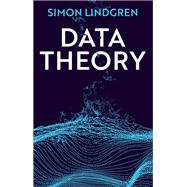
Data Theory Interpretive Sociology and Computational Methods
by Lindgren, SimonBuy New
Rent Textbook
Rent Digital
Used Textbook
We're Sorry
Sold Out
How Marketplace Works:
- This item is offered by an independent seller and not shipped from our warehouse
- Item details like edition and cover design may differ from our description; see seller's comments before ordering.
- Sellers much confirm and ship within two business days; otherwise, the order will be cancelled and refunded.
- Marketplace purchases cannot be returned to eCampus.com. Contact the seller directly for inquiries; if no response within two days, contact customer service.
- Additional shipping costs apply to Marketplace purchases. Review shipping costs at checkout.
Summary
In this experimental and provocative book, Simon Lindgren argues that a hybrid approach to data and theory must be developed in order to make sense of today's ambivalent, turbulent, and media-saturated political landscape. He pushes for the development of a critical science of data, joining the interpretive theoretical and ethical sensibilities of social science with the predictive and prognostic powers of data science and computational methods. In order for theories and research methods to be more useful and relevant, they must be dismantled and put together in new, alternative, and unexpected ways.
Data Theory is essential reading for social scientists and data scientists, as well as students taking courses in social theory and data, digital methods, big data, and data and society.
Author Biography
Table of Contents
1 Beyond Method
2 Decoding Social Forms
3 Unintended Consequences
4 Actor-Networks
5 Collective Presentations
6 Symbolic Power
7 Theoretical I/O Conclusion: Theory/Data
References
Index
An electronic version of this book is available through VitalSource.
This book is viewable on PC, Mac, iPhone, iPad, iPod Touch, and most smartphones.
By purchasing, you will be able to view this book online, as well as download it, for the chosen number of days.
Digital License
You are licensing a digital product for a set duration. Durations are set forth in the product description, with "Lifetime" typically meaning five (5) years of online access and permanent download to a supported device. All licenses are non-transferable.
More details can be found here.
A downloadable version of this book is available through the eCampus Reader or compatible Adobe readers.
Applications are available on iOS, Android, PC, Mac, and Windows Mobile platforms.
Please view the compatibility matrix prior to purchase.
